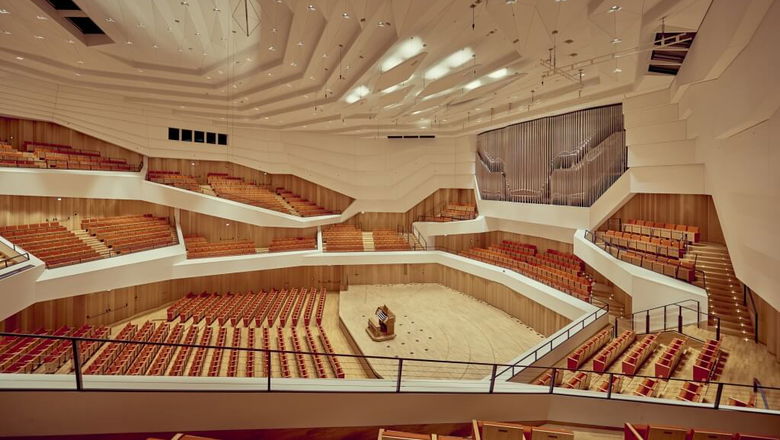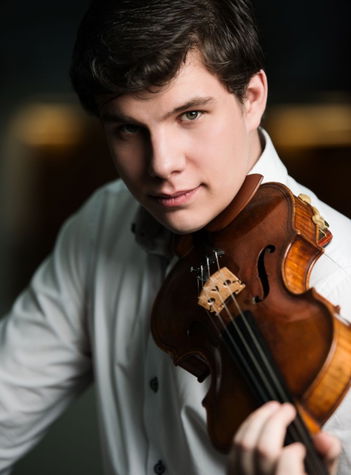1 / 6
Czech Philharmonic • Dresden
In June, the Czech Philharmonic will bring to Dresden a programme consisting entirely of works by Bedřich Smetana. At the traditional Dresdner Musikfestspiele, the orchestra will play under the direction of its guest conductor Jakub Hrůša.
Programme
Bedřich Smetana
Bartered Bride, overture to the opera
Georginen Polka in D major
Festive Overture in D major, Op. 4
String Quartet No. 1 in E minor "From My Life", 1st movement
Hakon Jarl, symphonic poem, Op. 16
— Intermission —
Bedřich Smetana
The Two Widows, overture to the opera
"From My Homeland" for violin and orchestra (arr. Tomáš Ille)
The Prague Carnival
Vltava, symphonic poem from the cycle My Country
Performers
Jan Mráček violin
Jakub Hrůša conductor
Czech Philharmonic

To purchase online, visit the event presenter's website.
Performers
Jan Mráček violin

The Czech violinist Jan Mráček was born in 1991 in Pilsen and began studying violin at the age of five with Magdaléna Micková. From 2003 he studied with Jiří Fišer, graduating with honors from the Prague Conservatory in 2013, and until recently at the University of Music and the Performing Arts in Vienna under the guidance of the Vienna Symphony concertmaster Jan Pospíchal.
As a teenager he enjoyed his first major successes, winning numerous competitions, participating in the master classes of Maestro Václav Hudeček – the beginning of a long and fruitful association. He won the Czech National Conservatory Competition in 2008, the Hradec International Competition with the Dvořák concerto and the Janáček Philharmonic Orchestra in 2009, was the youngest Laureate of the Prague Spring International Festival competition in 2010, and in 2011 he became the youngest soloist in the history of the Czech Radio Symphony Orchestra. In 2014 he was awarded first prize at Fritz Kreisler International Violin Competition at the Vienna Konzerthaus. When the victory of Jan Mráček was confirmed, there was thunderous applause from the audience and the jury. The jury president announced, “Jan is a worthy winner. He has fascinated us from the first round. Not only with his technical skills, but also with his charisma on stage.”
Jan Mráček has performed as a soloist with world’s orchestras, including the Royal Philharmonic Orchestra, St. Louis Symphony, Symphony of Florida, Tchaikovsky Symphony Orchestra, Kuopio Symphony Orchestra, Romanian Radio Symphony, Lappeenranta City Orchestra (Finland) as well as the Czech National Symphony Orchestra, Prague Symphony Orchestra (FOK), Janáček Philharmonic Orchestra and almost all Czech regional orchestras.
Jan Mráček had the honor of being invited by Maestro Jiří Bělohlávek to guest lead the Czech Philharmonic Orchestra in their three concert residency at Vienna’s Musikverein, and the European Youth Orchestra under Gianandrea Noseda and Xian Zhang on their 2015 summer tour. He has been a concertmaster of the Czech Philharmonic since 2018.
In 2008 he joined the Lobkowicz Piano Trio, which was awarded first prize and the audience prize at the International Johannes Brahms Competition in Pörtschach, Austria in 2014.
His recording of the Dvořák violin concerto and other works by this Czech composer under James Judd with the Czech National Symphony Orchestra was recently released on the Onyx label and has received excellent reviews.
Jan Mráček plays on a Carlo Fernando Landolfi violin, Milan 1758, generously loaned to him by Mr Peter Biddulph.
Jakub Hrůša principal guest conductor

Born in the Czech Republic, Jakub Hrůša is Chief Conductor of the Bamberg Symphony, Music Director Designate of the Royal Opera, Covent Garden (Music Director from 2025), and Principal Guest Conductor of the Czech Philharmonic. He was also formerly Principal Guest Conductor of the Orchestra dell’Accademia Nazionale di Santa Cecilia, the Philharmonia Orchestra, and Tokyo Metropolitan Symphony Orchestra.
He is a frequent guest with the world’s greatest orchestras, including the Vienna, Berlin, Munich and New York Philharmonics; Bavarian Radio, NHK, Chicago and Boston Symphonies; Leipzig Gewandhaus, Lucerne Festival, Royal Concertgebouw, Mahler Chamber and The Cleveland Orchestras; Orchestre Philharmonique de Radio France, and Tonhalle Orchester Zürich. He has led opera productions for the Salzburg Festival (Káťa Kabanová with the Vienna Philharmonic in 2022), Vienna State Opera, Royal Opera House, and Opéra National de Paris. He has also been a regular guest with Glyndebourne Festival and served as Music Director of Glyndebourne On Tour for three years.
His relationships with leading vocal and instrumental soloists have included collaborations in recent seasons with Daniil Trifonov, Mitsuko Uchida, Hélène Grimaud, Behzod Abduraimov, Anne Sofie Mutter, Lisa Batiashvili, Joshua Bell, Yefim Bronfman, Rudolf Buchbinder, Gautier Capuçon, Julia Fischer, Sol Gabetta, Hilary Hahn, Janine Jansen, Karita Mattila, Leonidas Kavakos, Lang Lang, Josef Špaček, Jean-Yves Thibaudet, Yuja Wang, Frank Peter Zimmermann, Alisa Weilerstein and others.
As a recording artist, Jakub Hrůša has received numerous awards and nominations for his discography. Most recently, he received the Opus Klassik Conductor of the Year 2023 prize and the ICMA prize for Symphonic Music for his recording of Bruckner’s Symphony No. 4, and the Preis der Deutschen Schallplattenkritik for his recording of Mahler’s Symphony No. 4, both with Bamberg Symphony. In 2021, his disc of Martinů and Bartók violin concertos with Bamberg Symphony and Frank Peter Zimmermann was nominated for BBC Music Magazine and Gramophone awards, and his recording of the Dvořák Violin Concerto with the Bavarian Radio Symphony and Augustin Hadelich was nominated for a Grammy Award.
Jakub Hrůša studied at the Academy of Performing Arts in Prague, where his teachers included Jiří Bělohlávek. He is President of the International Martinů Circle and The Dvořák Society. He was the inaugural recipient of the Sir Charles Mackerras Prize, and in 2020 was awarded both the Antonín Dvořák Prize by the Czech Republic’s Academy of Classical Music, and – together with Bamberg Symphony – the Bavarian State Prize for Music.